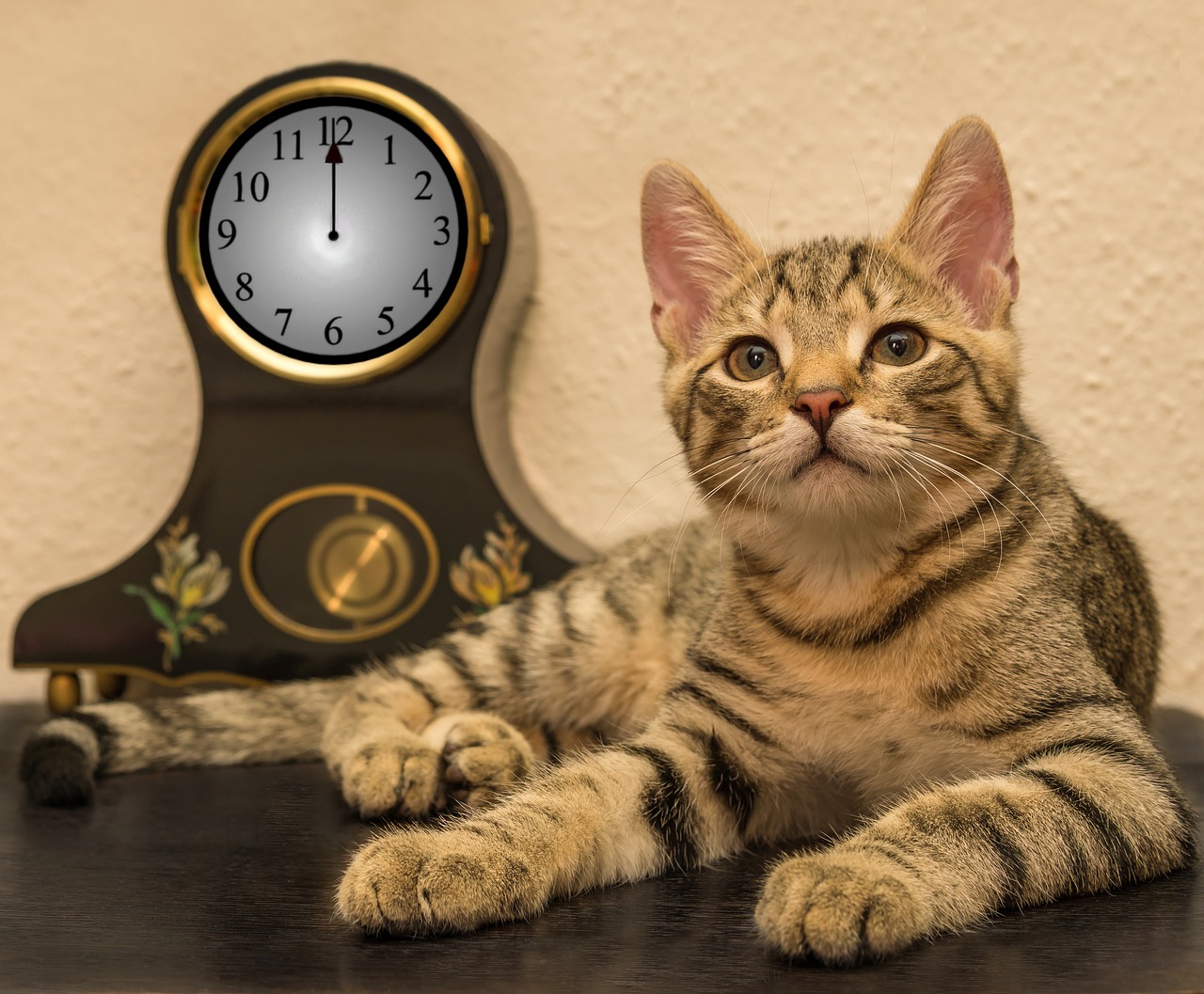The time change (Daylight Savings Time ending) is on Sunday, November 5th, 2023*
*for the USA and certain other countries – check specific dates for other countries here
I’ve seen a lot of posts about the time changes and how it affects our pets. How can you tell your pet about the time change?
Don’t leave them in the dark about it, or they will be confused and confounded when nothing happens according to their routine and schedule.
And a confused being can be unstable, fretful, acting out in weird ways, and it can even affect their health and wellbeing.
Just this morning, I got an email from a concerned dog parent.
He said:
So I’m already an early riser as if you can’t tell. But as I was walking my dog at 5:15 am this morning, I started to think 4:15 am is a bit too early. But time change is tonight – setting my clocks back an hour.
Made me want to find a way to try to communicate this to my dog (Toby – a 6 year old shih tzu).
I think something a lot of animal owners would want to know. Can you help?
Scott
The short answer here is to talk to them. Tell them what’s going on and why. Start by sending a message to them so they know what you know and what you’re thinking that they don’t yet.
For today, let me give you some tips on how to do this, then I highly recommend you get your copy of my free ebook for more details (see below on how to do that).
Lemme give you some tips on how to do this:
Animals understand time, they know what hours and minutes and days and weeks and months are.
When you talk about time, you can see a clock – I use an analog clock personally, but then I’m old school like that.
You can also feel the difference between the times of day, for instance, how does 5 am feel different from 4 am or from 6 am?
How does morning feel different than night? Just feel the time in your own body, they’ll get it. If they don’t?
They can ask for clarification. As long as you’re clear, usually animals will get it and be clear too.
Manage your feelings about the time change.
Are you happy about it? Upset about it?
Frustrated or irritated about it? However you feel is okay, just be conscious about it.
That’s important because animals pick up your feelings and energy easily, then they look inside your head to see what’s on your mental monitor, what are you focusing on.
Then they listen to what you say. They put all that together to try and make sense of what you’re communicating.
If you tell them a “happy” story that you don’t feel happy about? Then it’s not a happy story, is it!
Be honest, clear, in alignment with what you are thinking about, saying and feeling.
Because when you send a message to an animal, you will see it, feel it and say it.
Tell them the story about the time change, why it’s happening, and that it’s out of your control. Tell them how it will affect you and them and how you’ll adjust.
Ask them for their help. Be specific about what you want their help with so they know what to do and what not to do.
Be clear about when you’ll be feeding them and walking them starting Sunday or Monday and so on through the weeks to come.
Remind them every day of the time change, so you’ll be leaving for work 1 hour later in the morning, that means you’ll be returning 1 hour later in the afternoon or evening.
Their walk time will adjust, their feeding schedule will adjust, and so on.
Then comes the physical part – the doing of it. Be gentle and easy with them and yourself as you adjust to the time, okay? It’s fine to feed them a little later than “normal” or earlier or give them a snack to tide them through until you’ve all adjusted properly.
Post a comment or question below and let me know what happens, okay?
Now’s a great time to join the Animal Talk Coaching & Mastery Club.
Our LIVE Q&A Coaching Calls are the second Saturdays of each month.
You’ll get immediate access to the delightful series of intuitive development lessons, plus you’ll have over 300 animal teachers to practice with so you get proper feedback to improve your skills, enjoy new monthly trainings, and so much more.
You’ll also have the opportunity to earn free private student coaching sessions with me (regularly $125 each).
The Animal Talk Coaching & Mastery Club is THE PLACE to be if you’ve got questions or are feeling stuck, blocked or limited communicating with animals, or are tired of feeling isolated or alone, trying to figure this out all by yourself.
You can participate in the monthly Live Q&A Coaching calls where I can personally guide you in busting through blocks, advance your intuitive skills, work directly with you and your animals, and answer your questions.
You’ll also experience firsthand how communicating with animals really works in our guided, step by step process talking with our Featured Animal Teacher.
If you’re not a Club Member yet, now’s a great time to join us.
You won’t find this level of training available anywhere else.
Your path to becoming a better, more competent animal communicator is spelled out for you HERE
See you soon on The Heart School campus!
Wishing you and your animals much love, healing and good communication no matter what time it is!
Download my FREE Ebook Hidden Secrets to Communicating with Animals – just click on the picture below!
P.S. Now’s a great time to build your animal communication skills and grow your intuition so you can be your pets best friend and enjoy important – and entertaining – conversations with them every day.
If you want to be proficient and confident communicating with animals about anything they need help with – including dealing with pesky time changes – then you need to know how to do this too.
Because you just never know what animals are going to tell you or what they will need or want help with.
Platinum Club Members have immediate access to the entire Treasure Vault of recorded Masterclasses (77 available right now and counting including one on time travel to rewrite and heal the past, especially for trauma survivors, once you know how).
You won’t find this level of advanced training available anywhere else.
Now’s a great time to join us. Details are on this HERE
There is always more to discover about who we truly are, who our animals are, what we’re doing here, our purpose.
When you know how to speak their language with proficiency, everything in your life comes into better flow and alignment as you heal, evolve and grow into your best self.

Enjoyed this article? Here are three more to help you:
Who’s your spirit animal? The truth may surprise you
Clairaudience and 7 Ways to Grow Your Intuition
Exploring animal telepathy: How to send a powerful message in 3 easy steps












Love This Article.
Hi Val! Great to have you address this time issue!
I’d love to share a story. Years ago, our kids were friends with other kids that lived on a dairy farm, so obviously i met the parents during pick up/drop off.
The mother commented one day about the ‘time change’ and how the cows would come ‘running’ (?) when it was time to milk; the time change made it very confusing for them. She and her hubby developed a habit of starting to make-them-wait an extra 15 min to get hooked up to the machines, for a week.
And then, a week later, make-them-wait another 15 min to get milked for a another week! It took them a whole 4 weeks to shift their cows’ timing to get milked! (reverse this in the spring)
I was astounded!
Interesting thou, I’ve already been feeding my pups ‘a bit later’ this week for a few days, and will take this lesson to heart. Taking the time to be aware: treat your pet’s issues so they can continue to do their job with less stress and anxiety, will make life a lot easier for everyone!
Warmth, Kathryn